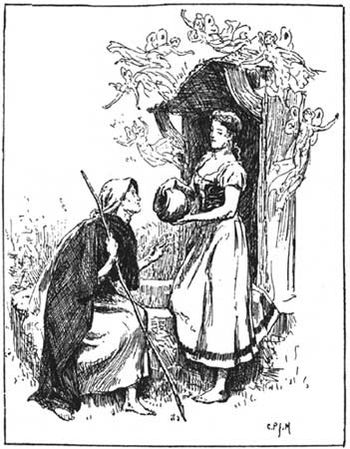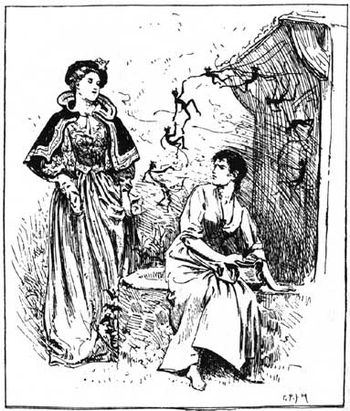Toads and Diamonds
(MP3-5' 25'')
THERE was once upon a time a widow who had two daughters. The eldest was so much like her in the face and humor that whoever looked upon the daughter saw the mother. They were both so disagreeable and so proud that there was no living with them.
The youngest, who was the very picture of her father for courtesy and sweetness of temper, was withal one of the most beautiful girls ever seen. As people naturally love their own likeness, this mother even doted on her eldest daughter and at the same time had a horrible aversion for the youngest—she made her eat in the kitchen and work continually.
Among other things, this poor child was forced twice a day to draw water above a mile and a-half off the house, and bring home a pitcher full of it. One day, as she was at this fountain, there came to her a poor woman, who begged of her to let her drink.
“Oh! ay, with all my heart, Goody,” said this pretty little girl; and rinsing immediately the pitcher, she took up some water from the clearest place of the fountain, and gave it to her, holding up the pitcher all the while, that she might drink the easier.

The good woman, having drunk, said to her:
“You are so very pretty, my dear, so good and so mannerly, that I cannot help giving you a gift.” For this was a fairy, who had taken the form of a poor country woman, to see how far the civility and good manners of this pretty girl would go. “I will give you for a gift,” continued the Fairy, “that, at every word you speak, there shall come out of your mouth either a flower or a jewel.”
When this pretty girl came home her mother scolded her for staying so long at the fountain.
“I beg your pardon, mamma,” said the poor girl, “for not making more haste.”
And in speaking these words there came out of her mouth two roses, two pearls, and two diamonds.
“What is it I see there?” said the mother, quite astonished. “I think I see pearls and diamonds come out of the girl’s mouth! How happens this, child?”
This was the first time she had ever called her child.
The poor creature told her frankly all the matter, not without dropping out infinite numbers of diamonds.
“In good faith,” cried the mother, “I must send my child thither. Come hither, Fanny; look what comes out of thy sister’s mouth when she speaks. Wouldst not thou be glad, my dear, to have the same gift given thee? Thou hast nothing else to do but go and draw water out of the fountain, and when a certain poor woman asks you to let her drink, to give it to her very civilly.”
“It would be a very fine sight indeed,” said this ill-bred minx, “to see me go draw water.”
“You shall go, hussy!” said the mother; “and this minute.”
So away she went, but grumbling all the way, taking with her the best silver tankard in the house.
She was no sooner at the fountain than she saw coming out of the wood a lady most gloriously dressed, who came up to her, and asked to drink. This was, you must know, the very fairy who appeared to her sister, but now had taken the air and dress of a princess, to see how far this girl’s rudeness would go.
“Am I come hither,” said the proud, saucy one, “to serve you with water, pray? I suppose the silver tankard was brought purely for your ladyship, was it? However, you may drink out of it, if you have a fancy.”

“You are not over and above mannerly,” answered the Fairy, without putting herself in a passion. “Well, then, since you have so little breeding, and are so disobliging, I give you for a gift that at every word you speak there shall come out of your mouth a snake or a toad.”
So soon as her mother saw her coming she cried out:
“Well, daughter?”
“Well, mother?” answered the pert hussy, throwing out of her mouth two vipers and two toads.
“Oh! mercy,” cried the mother; “what is it I see? Oh! it is that wretch her sister who has occasioned all this; but she shall pay for it”; and immediately she ran to beat her. The poor child fled away from her, and went to hide herself in the forest, not far from thence.
The King’s son, then on his return from hunting, met her, and seeing her so very pretty, asked her what she did there alone and why she cried.
“Alas! sir, my mamma has turned me out of doors.”
The King’s son, who saw five or six pearls and as many diamonds come out of her mouth, desired her to tell him how that happened. She thereupon told him the whole story; and so the King’s son fell in love with her, and, considering himself that such a gift was worth more than any marriage portion, conducted her to the palace of the King his father, and there married her.
As for the sister, she made herself so much hated that her own mother turned her off; and the miserable wretch, having wandered about a good while without finding anybody to take her in, went to a corner of the wood, and there died.
Charles Perrault.
Rospi e diamanti
C’ERA una volta una vedova che aveva due figlie. La maggiore era così simile a lei di aspetto e carattere che chiunque vedesse la figlia, vedeva la madre. Erano entrambe così antipatiche e orgogliose che erano insopportabili.
La più giovane, che era il ritratto del padre per la gentilezza e la dolcezza del carattere, era inoltre una delle più belle fanciulle mai viste. Siccome la gente naturalmente ama il proprio simile, questa madre stravedeva per la figlia maggiore e nel medesimo tempo aveva sviluppato un’orribile avversione per la più giovane: la faceva mangiare in cucina e lavorare continuamente.
Tra le altre cose questa povera fanciulla era costretta ad andare due volte il giorno ad attingere acqua a un miglio e mezzo da casa e a riportarne indietro una brocca piena. Un giorno, mentre era presso la fontana, giunse una povera donna che la pregò di darle da bere.
“Con tutto il cuore, buona donna,” disse la bella ragazza e, sciacquando immediatamente la brocca, prese un po’ d’acqua nel punto più limpido della fontana e gliela diede, reggendo nel frattempo la brocca così che la donna potesse bere più facilmente.

Dopo aver bevuto, la buona donna le disse:
“Sei così graziosa, mia cara, così buona e di belle maniere che non posso fare a meno di darti un dono.” perché era una fata che aveva preso l’aspetto di una povera popolana per vedere fin dove arrivassero l’educazione e le buone maniere di questa bella fanciulla. “Ti darò un dono,” proseguì la fata, “ogni parola che pronuncerai, dalla tua bocca uscirà un fiore o un gioiello.”
Quando questa bella fanciulla tornò a casa, la madre la rimproverò per che era rimasta troppo a lungo presso la fontana.
“Ti chiedo scusa, mamma,” disse la povera ragazza, “per non aver fatto più in fretta.”
E mentre pronunciava queste parole, dalla sua bocca uscirono due rose, due perle e due diamanti.
“Che cosa vedo qui?” chiese la madre, sbalordita. “Credo di vedere perle e diamanti uscire dalla bocca della ragazza! Che cosa è successo, figlia?”
Era la prima volta in cui l’avesse mai chiamata così.
La povera creatura le raccontò con sincerità tutto ciò che era accaduto, non senza lasciar cadere un gran numero di diamanti.
“In fede mia,” esclamò la madre, “devo mandare laggiù mia figlia. Vieni qui, Fanny, guarda che cosa esce dalla bocca di tua sorella quando parla. Non saresti contenta, mia cara, che ti fosse fatto il medesimo dono? Non dovrai fare altro che andare ad attingere acqua alla fontana e quando una certa povera donna di chiederà di darle da bere, tu glielo darai assai educatamente.”
“Sarebbe davvero un bello spettacolo” disse questa impudente maleducata, “vedermi andare ad attingere acqua.”
“Tu andrai, sfacciata!” disse la madre “e all’istante.”
Così la ragazza andò, brontolando per tutta la strada, portando con sé il miglior boccale d’argento di casa.
Era appena arrivata alla fontana che vide uscire dal bosco una dama vestita splendidamente, la quale venne verso di lei e le chiese da bere. Dovete sapere che era proprio la fata apparsa a sua sorella, ma ora aveva l’aspetto e l’abito di una principessa per vedere quanto si sarebbe manifestata la villania di questa ragazza.
“Sono venuta qui” disse quella superba e insolente ragazza, “per servirvi l’acqua, di grazia? Suppongo che il boccale d’argento sia stato portato solamente per vostra signoria, vero? In ogni modo potete bere senza, se ne avete voglia.”

“In aggiunta non sei educata,” rispose la fata, senza incollerirsi. “Ebbene, allora, visto che hai così poca educazione e sei così scortese, ti faccio un dono: a ogni parola che pronuncerai, ti usciranno dalla bocca una serpe o un rospo.”
Così appena la madre la vide tornare, gridò:
“Ebbene, figlia?”
“Ebbene, madre?” rispose l’insolente sfacciata, lanciando dalla bocca due vipere e due rospi.
“Oh, cielo,” esclamò la madre, “che cosa vedo? È stata quella malvagia di tua sorella a provocare tutto ciò, ma pagherà per questo.” e immediatamente corse a picchiarla. La povera ragazza fuggì da lei e andò a nascondersi nella foresta, non lontano da lì.
Il figlio de re, di ritorno dalla caccia, la incontrò e, vedendo come fosse bella, le chiese che cosa stesse facendo lì da sola e perché piangesse.
“Ahimè, mia madre mi ha cacciata di casa.”
Il figlio del re, che vide cinque o sei perle e altrettanti diamanti uscirle di bocca, volle che gli raccontasse che cosa fosse successo. Allora lei gli raccontò tutta la storia e così il figlio del re s’innamorò di lei e, considerando che un tale dono valesse più di qualsiasi dote matrimoniale, la condusse con sé al palazzo del re suo padre e lì la sposò.
Quanto a sua sorella, si rese così odiosa che persino la sua stessa madre l’abbandonò; e la miserabile infelice, dopo aver vagato per un bel po’ senza trovare nessuno che si prendesse cura di lei, andò in un angolo del bosco e lì morì.
Charles Perrault.
(traduzione dall'inglese di Annarita Verzola)